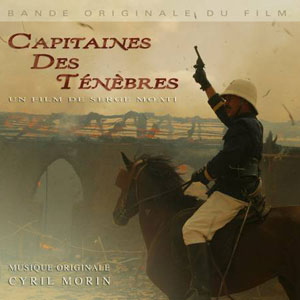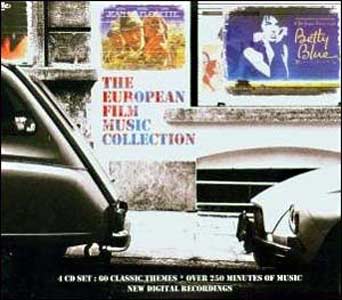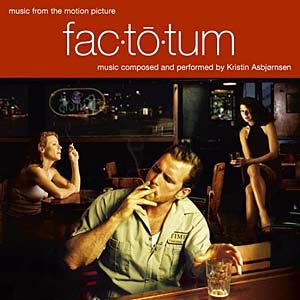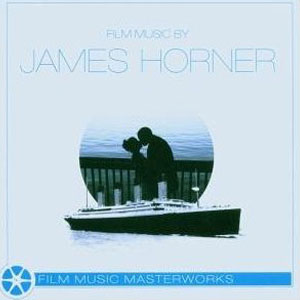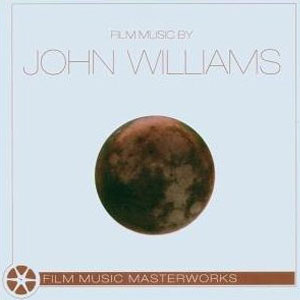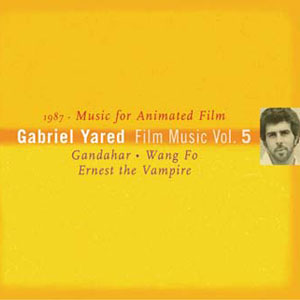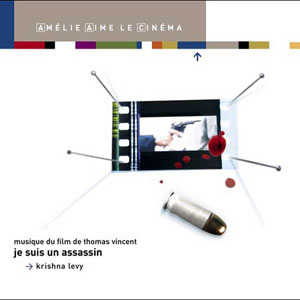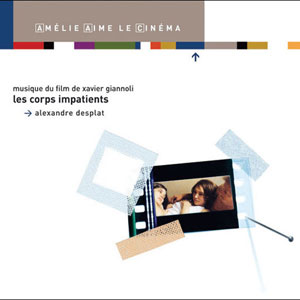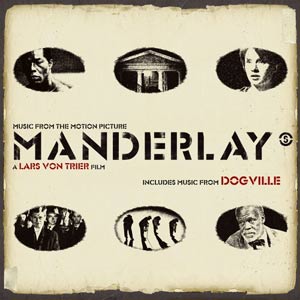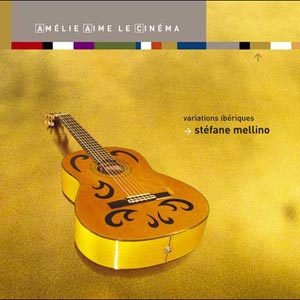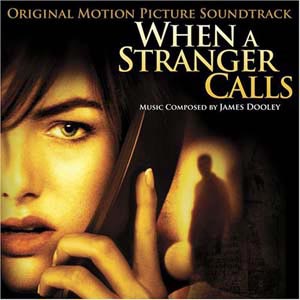Editorial: Also Received
We always receive more CDs for review than we often have time to review, so to give these releases some ‘airtime’ (as opposed to sitting unreviewed), we conceived of a shorter review format that hopefully captures the essentials of the album under consideration.
Capitaine des Tenebres (Cyril Morin – Cinefonia Records CFR-019; 47:52)
The name Cyril Morin will doubtless be familiar to those who’ve seen Pan Nalin’s Buddhist romance Samsara. Perhaps one of the strongest film compositions to fuse folk and world music textures with a traditional string orchestra, Morin’s score was the romantic heart of that film, and deserved more acclaim than it had. It’s something of a shame then that his music for this French television production, stills for which feature French soldiers in period colonial garb in desert locales, is somewhat anaemic. As always with Morin, there’s an emphasis on incorporating instruments specific to the film’s locale – and this score has much of that: woodwinds, percussion and vocals all suggestive of Northern Africa. There’s a small orchestra involved – though I suspect it doesn’t go beyond the strings, as every appearance by solo brass instruments feels sampled (and to be honest, so do some of the string lines).
There are moments of interest – the slightly minimalist development of ‘La Soif’, and the expansive string melody that recurs throughout (e.g. ‘Dernier Depart’). But unlike Samsara there’s not a strong melodic focus to the exotic instrumentation: it comes off as textural adornment, and familiar at that. Fans of the composer will recognise his style regardless, and may derive more from that than I did. For others, Niki Reiser’s score to Nowhere in Africa and Alberto Iglesias’s The Constant Gardener both explore similar material with more successful album results. Not bad, but less than it should have been.
Michael McLennan
Rating:2.5
The European Film Music Collection (City of Prague Philharmonic - Silva Screen SILCD1207)
Running times: [55.05, 69.20, 71.20, 62.22]
Four CDs, sixty tracks and around four hours of music in generally strong performances from the dependable Silva Screen and the City of Prague Philharmonic. There’s nothing wrong with the individual pieces, but the way they’ve been put together is a little problematic. For one thing, following the logic of the title Europe consists of just five countries: France, Italy, Greece, Poland and Germany. And Poland is really just worth half a country as its contribution is the French-Polish La Double Vie de Véronique. And the German film, The Tin Drum, is represented by Frenchman Maurice Jarre. Another problem is that whether or not tracks work well together as a listening experience is very hit and miss, as they have been sequenced alphabetically, by the English language versions of their original titles. Which is effectively to say, at random. Arguably the worst sequencing is the incredibly irritating synth-drums of Ennio Morricone’s Le Professional (the tune itself is lovely) leading into the glorious elegiac orchestral music Miklos Rozsa crafted for Providence. That said, the notoriously difficult to achieve electronic music recreations faithfully capture the sound – for good or ill – of the original synthesised cues.
The good news is that there is a lot of excellent music here and the set will serve as a fine primer to those not wishing to plunge head-first into the world of Continental soundtracks. The emphasis tends to be on romantic melody, covering everything from Amacord to Zorba the Greek, taking in Betty Blue (an effective suite of the main themes), Bilitis, Jean De Florette, Novecento, The Red Tent and many others. Three tracks from Bruno Coulais’ Les Chorists are particularly effective and soprano Charlotte Kinder uncannily recaptures the beauty of Preisner’s La Double Vie de Véronique. Likewise Jill Washington does a wonderful job with the wordless soprano vocal for Once Upon A Time in the West. On the other hand the solo trumpet on George Delerue’s wonderful La Nuit Américaine (Day for Night) is unforgettable for all the wrong reasons.
Actually the European Film Music Collection (what, no British music – perhaps we’ve drifted off into the mid-Atlantic and departed the EU) is really a compilation of French and Italian film themes with a handful of other tracks included, and represents one of Silva Screen’s regular inventive repackagings of its catalogue. Still that means good value for customers and a steady supply of good new recordings, so any complaints I have voiced should be taken in that context. And I must emphasize that there is a lot of very good music here.
Gary Dalkin
Rating:3.5
Factotum (Kristin Asbjornsen – Milan Records M2-36157; 50:36)
Scandinavian jazz artist Kristin Asbjornsen provides the music that Charles Bukowksi never knew he was writing to in this album for Bent Hamer’s film about Bukowski’s fictional alter-ego, Hank Chinaski. I can’t confess to seeing the film, despite it sporting the single-best trailer I saw this year. That trailer was edited to the lazy showstopper at the core of this soundtrack – ‘Slow Day’ – which wrap Bukowski’s defeatist poetry up in a gradual melody and stripped-down arrangement (Asbjornsen’s world-weary voice, string quartet, drum-n-bass, electric and acoustic guitars) that truly make it one of the best songs of this year, for film or any medium. There are other songs: the even more weary ‘I wish to weep’ (also from Bukowski lyrics). The better part of the underscore is derived from the basic ingredients from these songs (‘I wish to leave’ and ‘Slow Day’ mostly), lending a consistency to the song-score package that’s rare in contemporary film-making. You can sense that it’s good film scoring too: the melodies develop gradually over the album before their definitive presentation with Bukowski’s poetry, and if the whole thing is a little long as a album, the slack at least works to build the distinctly lethargic mood. Definitely not for those who like film music to be orchestral (because it isn’t here), but worth seeking out for those with an ear for a serious popular-music based approach to film scoring.
Michael McLennan
Rating:3.5
Film Music By James Horner(James Horner/ City of Prague Philharmonic - SILCD2004; 56:00)
Collecting together recordings of selections from the most recognisable films scored by James Horner, this new budget-priced collection in Silvas’ Masterworks series is not as strong as the recently-issued John Williams collection, mostly due to the lack of new material. Everything here has appeared on a Silva compilation previous. Perhaps reflecting the decline in the composer’s knack for picking instant Oscar bait, the most recent inclusion is a suite of Horner’s replacement score for Wolfgang Petersen’s Troy. Not as arresting as the original soundtrack recording, this suite sadly sets the precedent for most of what’s here – faithful-but-redundant readings of a repetoire that mixes Horner’s identifiable attractive hymnal writing with his equally identifiable (uncredited) adaptations of iconic phrases from sources as diverse as Schumann (Willow), Mascagni (The Mask of Zorro), Holst (Braveheart’s rhapsodic love theme), Britten (Troy’s Trojan theme), Shostakovich (the Achilles theme) and Ralph Vaughan-Williams (Troy’s love theme isn’t quite Thomas Tallis, but it’s not far off) among others. Yet for all diverse influences channelled here, there’s a remarkable consistency to it – and that is Horner’s skill: to mould familiar ideas in fresh ways to the emotional needs of each film he comes to.
Not a bad start for those who’ve never really collected film music and want a collection of attractive themes from popular film, but the serious film score collector will find the selections too crowd-pleasing (especially considering the strength Horner’s recent work – The Chumscrubber, All the King’s Men, Iris and Beyond Borders all come to mind) and the performance a bit weak next to the Horner-conducted original soundtrack recordings with which they will doubtless be familiar.
Michael McLennan
Rating (serious film score collectors):2
Rating (casual non-collector):4
Film Music By John Williams (John Williams/ City of Prague Philharmonic - SILCD2005; 58:16)
Also from Silva is this John Williams collection, the latest entry in an on-going series of budget compilations. Most of the dozen re-recordings here have appeared on various previous Silva Screen anthologies, though to bring things up to date there are recordings of music from each of Williams’ four most recent scores. Of these ‘Battle of the Heroes’ from Star Wars: Episode III: Revenge of the Sith comes out with flying colours, as does a superb reading of a seven minute suite from War of the Worlds. The ‘Prayer for Peace’ from Munich ends the album effectively, but letting the side down is the recording of ‘Sayuri’s Theme and End Credits’ from Memoirs of a Geisha. Here the tempos and phrasing are constantly off, proving the uncredited solo musicians are, unsurprisingly, no match for Yo Yo Ma and Isaac Perlman. Still, a fine budget compilation, unless you are specifically buying it for the music from Memoirs of a Geisha. The older recordings are among Silvas’ best, including fine takes on Star Wars, Jaws and Raiders of the Lost Ark.
Gary Dalkin
Rating:3.5
Michael McLennan adds:-
I too found myself engaged by this new compilation from Silva. No-one ever quite captures Williams’s material quite as well as the man himself (except perhaps, for composer/conductor John Scott), but for all that, fresh recordings of Williams’ most recent scores bring out different qualities in those pieces. ‘Battle of the Heroes’ is little gradual, but is recorded and mixed quite differently to Shawn Murphy’s original soundtrack recording, drawing out details not previously evident. The War of the Worlds suite is similarly excellent, but (as Gary says) the reading of Memoirs is gradual to a fault. The classy exuberance of that piece lurches and sways off course, in the process revealing just how skilled the Hollywood Studio Symphony’s original performance was. Recommended for the beginner or for the serious collector interested in a fresh take on recent material.Michael McLennan
Rating:3.5
Gabriel Yared Film Music Vol. 5: Music for Animated Films(Gabriel Yared –Cinefonia/Yad Records CFY-005; 70:58)
Fans of Gabriel Yared’s lush orchestral style will find this compilation of three of his scores for French TV-based animation a fascinating look at the composer’s voice as filtered through a wholly different musical technology – a range of the best synthesizers the mid-1980s had to offer. Those who cringe at the very idea probably shouldn’t even consider this release from Cinefonia: seek out other titles in their Gabriel Yared and Les Notes de L’Ecran collections instead. For those who can see past the budget-constraints of the project however, this is a fascinating if unusual listen.
Though three animated scores are included here, Comment Wang-Fo Fut Sauve (1987) is represented by only two short tracks, so this album is more a showcase for Ernest le Vampire (1986-??) and Gandahar (1988). The former is a delight – the 21-short tracks each underscoring a two-minute episode of the show with a variation on the two playful ideas Yared conceived for the titular character. Tangos, waltzes, marches, Bachian preludes – these forms and many more are inspired by the adventures of the cute pachyderm-vampire. Hearing what Yared does with the theme is great.
Gandahar is more serious science-fiction fare. ‘Les Rêves D'Airelle’ is one of his typically beautiful themes; ‘Gandahar’ is an impressive contrapuntal fanfare; ‘Le Métamorphe’ depicts a transformation with a mechanical music that is almost comparable to a Roman march from a Rozsa score. Similarly formal (though less foreboding) is ‘La Marche Des Transformés’. Most beautiful of all is ‘Les Oiseaux –Miroirs’: light as a feather with its cascading synths. Unlike Ernest though, the basic material is at odds with the synthesized delivery – at least with the music for Ernest, we know we’re meant to laugh, and the cheesy synths don’t bother nearly as much as they do here. Nonetheless the writing is good, and the hand of the composer is more than evident in an effort that is not without its rewards.
Production by Cinefonia Records is strong as always. The bilingual liner notes (French and English) provide essential context for understanding the different motivations behind the three scores.
Michael McLennan
Rating:2 (if you anticipate all-synthesized music will be a problem)
Rating:3.5 (if you don’t)
Je Suis Un Assassin (Krishna Levy – Amelie Aime le Cinema Wagram 3099802; 35:09)
Krishna Levy defies ‘pigeon-holing’. His score for Au bout du monde a gauche was a deft blend of comedy and drama scoring for orchestra. His 8 Femmes score was closer to pastiche, gloriously kitschy if you’re in the mood, guaranteed to annoy if you aren’t. Je Suis un Assassin couldn’t be more different. The film’s plot owes a debt to Hitchcock’s Strangers on a Train, and for the most part this is un-intrusive thriller music at its purest. While not sustained droning quite on the level of David Julyan’s music for The Prestige, ‘Generique Debut’ sets forth the dominant idea of this score: near-atonal clustering along the lines of the late Gyorgy Ligeti’s ‘Atmospheres’. The opening eight tracks of the score hold true to this chromatic premise – bordering on uninteresting at times despite the effective tension such music obviously evokes.
When melody does eventually surface in ‘Suzy dans le banc’ – the theme romantic and doom-laden – it suggests that poor Suzy’s fate is dire indeed. The Suzy theme gives the second half of the album the life the first half lacked – the sinuous string variations on the theme amidst the atonal clustering the most effective material of all. It doesn’t quite add up to a completely workable album – the opening is too serviceable to really get past even in this relatively short album – but those who like purely textural film music will find a great deal to enjoy here. The second half is very strong, and it’s not hard to imagine this material serving a suspense thriller admirably.
Amelie Aime le Cinema’s production values are strong as always. French readers will find much to chew on in the liner notes.
Michael McLennan
Rating:3
Les Corps Impatients (Alexandre Desplat – Amelie Aime le Cinema Wagram 3094272; 17:26)
Could any CD of seventeen minutes length be worth buying? In the case of Amelie Aime le Cinema’s release of the score for Xavier Giannoli’s Les Corps Impatients, it isn’t simply that there are only seventeen minutes of score on the disc, but that there is nothing else. It’s remarkable to think that such a release could be viable in the age of iTunes-only releases, and I’m grateful: for the composer is none other than one of brightest lights of modern film music, Alexandre Desplat. With a remarkable range of French (De Battre Mon Couer s’est Arrete, Une Chance Sur Deux) and English (Birth, Hostage, Syriana, The Queen) language films to his name, Desplat has developed a style of film music that is truly unique.
His music for Les Corps Impatients is elegant and rich in emotion, appropriate for a film about a man dying of cancer. The score is a suite of six or seven cues (it’s hard to tell) for string orchestra edited together in a single track. There’s a sombre theme that slowly ascends in the celli, the high strings providing anguished dissonances as the piece achieves its climax. It’s incredibly moving without being remotely sentimental – sharing the austerity of the composer’s scores for Jacque Audiard’s De Battre Mon Couer S’est Arrete and Sur Mes Levres, but leaning more on the emotional catharsis of the latter than the tense minimalism of the former. (And as with the latter, there is a subtle use of a Desplat ‘trademark’ – subtle rhythmic use of chimes – here mixed very low and appearing sparingly.) There’s also intrigue – a common variation on the main theme twisting the ascent of the celli into a hesitant waltz; other cues rest on sustained dissonance in the high strings. If it doesn’t quite achieve the tone poem quality of De Battre, it’s still a remarkably strong piece, both classical in construction and cinematic in effect.
Amelie Aime Le Cinema’s production values are of the usual standard, meaning French-speakers have the most to gain from the liner notes. For the rest of us, there’s a digipak, and seventeen minutes of impressive music for film for high import prices. Hopefully a more accessible release that combines this score with other hard-to-find Desplat material will emerge in time.
Michael McLennan
Rating:4
Manderlay (Various, arranged by Joachim Holbeck – Milan M2-36155; 24:44)
I was somewhat surprised to hear that Lars von Triers’ as-yet-incomplete ‘American triptych’ of Dogville, Manderlay and an unnamed, unfilmed third chapter had yielded an album on Milan Records. Neither Dogville or Manderlay featured much in the way of music, both utilising excerpts from baroque perennials, most notably from Vivaldi’s Concerto in G Minor. The measured wisdom of baroque music and historically-associated ideas about ‘Enlightenment Man’ are an indispensable element of von Trier’s satirical tone in the films. In Dogville, as Tom Edison (Paul Bettany) tries to reconcile the appearance of good intentions of the town-folk with their selfish motives and actions, the combination of Vivaldi and John Hurt’s deliciously sardonic narration mocks the expectation that mankind can ever be more than predictable sum of selfish impulses.
In a way, what this short album lacks that would have really made it stronger is narration excerpts from the films. Hurt’s voiceover is such a strong part of the Dogville experience, that the music doesn’t seem nearly as ironic without it. (In a way, it almost comes across as schmaltzy!) On its own, what we have is a short collection of excerpts from pieces by Vivaldi, Albinoni, Handel, and Pergolesi, all arranged and conducted by von Trier’s recurring musical collaborator Joachim Holbeck (who must be eager for his director to get back to film-making that demands original music after the rigors of the Dogme’95 fiasco). The wizened theme from Vivaldi’s Concerto in G Minor provides the closest thing to an album throughline, with the end credit ‘cue’ from both films, David Bowie’s ‘Young Americans’, rounding out the twenty-six minute experience in a way that will probably be jarring for those who’ve been lulled by the eighteenth century stylings.
A short album from a remarkable (but understandably controversial) film. It doesn’t really feel like an essential purchase, unless you’re a particularly committed fan of the films or the use of baroque music in films.
Michael McLennan
Rating:4 (in film)
Rating:2 (on album)
Variations Ibérique (Stéfane Mellino - Amélie Aime le Cinéma Wagram 3111632 / WAG 361 / AIM 9; 31:49)
Unless you’re intimate with French eighties rock and roll, it’s doubtful that you’ll recognize the strummings of self-taught musician, Stéfane Mellino. A guitarist and later frontman for Les Négresses vertes, Mellino ventures into solo works on guitar in Variations Ibérique, but doesn’t exactly strike all the right chords—in the aesthetic sense.
Whether it’s the pseudo-philosophical tone of the artist interview (in the French liner notes) or the music itself, I had a difficult time finding any emotional resonance in the ideas and music. Mellino and the interviewer talk ad nauseum about meaning, interpretation, distillation, and artist experiences… but it all sort of boils down to inanity. Seriously, what is this guy saying? If you discount the concentrated, rock version of Algerian raï (“No Te Rebeles”, featuring worn vocals by Rafael Romero) at the end, there’s little of worth in the rest of the album.
Mellino is said to be ‘exploring new music territories' with his guitar. In this attempt, he’s trying to capture and weave together the simplicity—the essence of—life, culture, and who knows what! of the coasts of southern Europe, North Africa, and South America. It’s an abstract statement for an insubstantial album.
Of the thirteen tracks, twelve of them are strangely arranged, overly intellectualized, technically proficient, and have no tangible beginning or end. If this is what Mellino considers ‘aller à l’essentiel’ (getting to the essence), he doesn’t quite make it with the constant inclusion of rock stylings—whenever possible, or by performing traditional regional/ethnic rhythms on the guitar by repeating, short-lived variations of watered down melodies. Like any artist that is/was a part of a well established band (e.g., Chris Cornell of the former Soundgarden), Mellino has a difficult time straying from his Négresses vertes roots in the solo album. And however well he performs the pieces, he (unlike Cornell) fails to infuse in works something of his own… something unique.
Tina Huang
Rating:2
When a Stranger Calls (James Dooley – Lakeshore Records LKS-338592; 60:44)
When A Stranger Calls directed by Simon West (Tomb Raider), stars Camilla Belle as the 16 year old teenager who is the victim of a reign of terror while babysitting. A remake of a 1979 Steve Feke screenplay does not play nearly as well as the original which starred Carol Kane and Charles Durning. In all fairness, the target market is the young teenager (something which I went through over forty years ago) and I really had a difficult time relating to this highly predictable film.
If there are any interesting aspects of the James Dooley score it lies in the ‘Aftermath’ track. James creates a nice ending theme with the orchestra and a musical box harmony to complement his theme. Nice job! The opening track ‘The Carnival’ has a long opening which of course leads into what else but shrieking strings which you a hear a lot of on this soundtrack, along with wailing voices in the background and simple piano chords. ‘Fateful Drive’ has some decent cello and bass playing complemented with the strings which provides good underscore and ‘The House’ has some quieter chamber style music again with violins and piano giving some harmony. But so much of the 60+ minute soundtrack is territory that has been covered so many times in these types of shock horror/terror films that it was difficult for this reviewer to get through the material once much less several times which is required for a review. This soundtrack will attract the terror collector who tries to have all of the material on the market as well as the fan of the film. With that in mind in all fairness there will be no rating to this soundtrack.
Tom Kiefner
Rating: N/A
Return to Reviews Index
